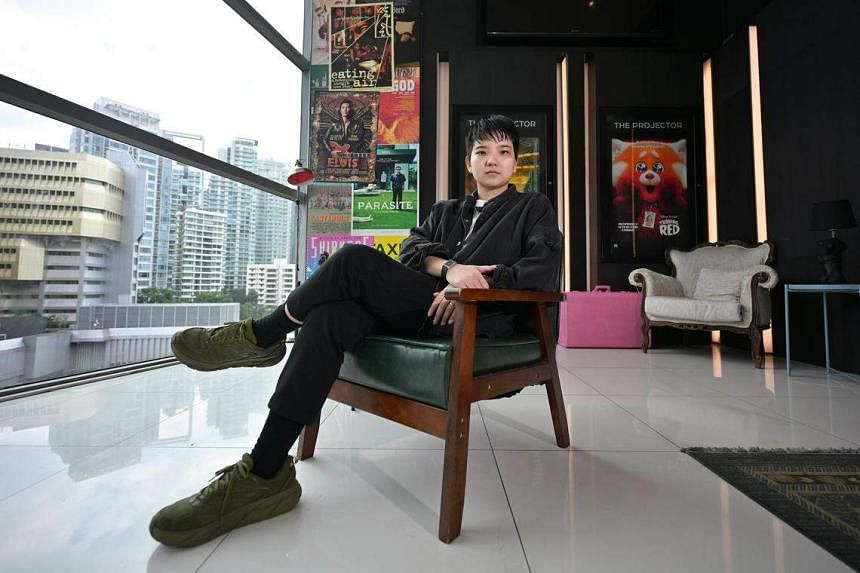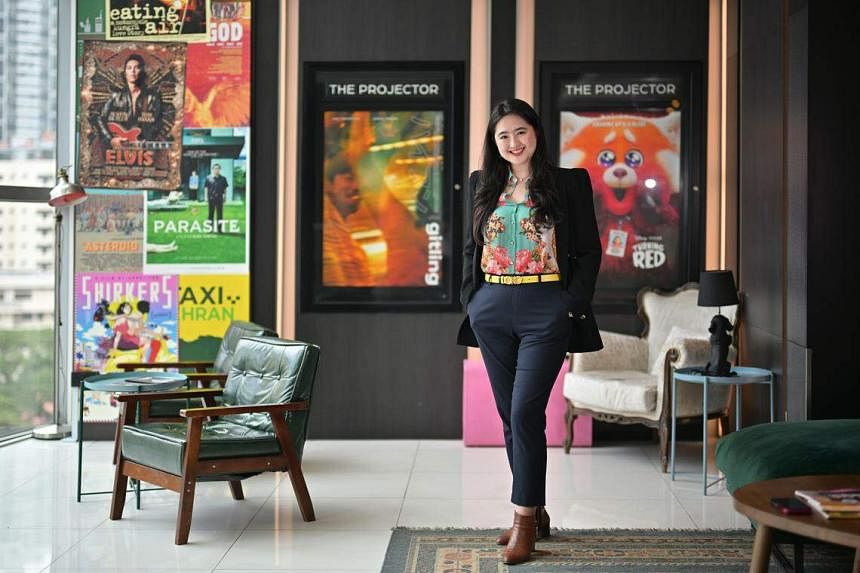SINGAPORE – A roll call of notable Singapore film directors will reveal a stark fact.
Of the record-breaking 10 films with Singapore participation selected to screen at major international festivals in 2023, only two were by female directors. Singaporean Nicole Midori Woodford helmed the drama Last Shadow At First Light, which screened at the San Sebastian International Film Festival. And Malaysian Amanda Nell Eu’s horror work Tiger Stripes won the Critics’ Week Grand Prize at the Cannes Film Festival.
Another notable Singaporean female director is Kirsten Tan, whose drama Pop Aye (2017) won the Special Jury Prize for screenwriting at the Sundance Film Festival.
Singapore’s skewed male-female representation is on trend with the rest of the world.
In a 2022 study sponsored by San Diego State University, a breakdown of the 250 highest-grossing movies of 2021 released in the American market showed that only 17 per cent were directed by women. It also showed that women made up roughly 30 per cent of people holding the title of producer and executive producer.
Tan Si En, a 31-year-old producer and co-founder of film and television production company Momo Film Co, reckons that Singapore is doing slightly better than the United States in one respect.
“I would say that 40 per cent of producers and directors in Singapore are women,” she says.

Tan notes that locally, while men have a small lead over women in the producer role, a handful of men has risen to prominence for their work on internationally acclaimed projects. They include Potocol’s Jeremy Chua and Akanga Film Asia’s Fran Borgia.
Singapore does not lack for female producers of note, however.
They include Sam Chua, assistant producer for Vietnamese film-maker Pham Thien An’s drama Inside The Yellow Cocoon Shell (2023), winner of the Camera d’Or at the Cannes Film Festival.
There is also Tan Fong Cheng, whose credits include the Eric Khoo-directed drama Be With Me (2005), Royston Tan’s comedy 881 (2007) and the upcoming fantasy-drama Spirit World. Helmed by Khoo, Spirit World stars French actress Catherine Deneuve and Japanese heart-throb Yutaka Takenouchi.
Ms Jean Ng, cluster director (media industry) at the Infocomm Media Development Authority (IMDA), says: “Female talent plays a crucial role in bringing out diversity in stories. Over the years, IMDA has nurtured trailblazers.”
She says the list includes directors such as Kirsten Tan and Woodford, along with veteran Mediacorp producer Chan Pui Yin and producers Tan Fong Cheng, Karen Khoo Toohey (the omnibus film 7 Letters, 2015) and Tan Si En.
Ms Ng adds: “We take immense pride in the achievements of our female talent and are committed to supporting our home-grown talent.”
However, American actress and producer Reese Witherspoon, speaking at a 2016 roundtable held by entertainment magazine Entertainment Weekly, said women are held to higher standards. Men who direct flops are given second and third chances, while women who make duds become Hollywood pariahs.
Tan Si En says: “Men are the luckier species.”
To help bring balance to the voices being heard, she works with women film-makers as much as possible.
She is producing Don’t Cry, Butterfly, the debut feature by Duong Dieu Linh, a female Vietnamese film-maker. The film is a multinational co-production supported with funding from the Singapore Film Commission (SFC). A festival release is planned for it in the second quarter of 2024.
With writer-director Kris Ong, Tan founded Momo Film Co in 2018. The label produced Nelson Yeo’s drama Dreaming & Dying (2023), which won two awards at the Locarno Film Festival.
Tan, along with fellow Singaporeans Low Ser En and Nelicia Low, is among the women in the local film industry set to make a splash in 2024.
Director Nelicia Low, 32, hopes to release her debut feature Pierce, a sports thriller, in festivals and cinemas in the second half of 2024. The cross-border co-production, filmed in Taiwan and starring Taiwanese actors Liu Hsiu-fu and Tsao Yu-ning and actress Ding Ning, is also supported by the SFC.
Producer Low Ser En, 33, is behind the documentary Singapore Films: To The World And Back, made to mark the 25th anniversary of the SFC.
It was put together by a team of women, including director Wee Li Lin (the drama-comedy Gone Shopping, 2007; and the romantic comedy Forever, 2010) with Rachel Liew taking the lead on cinematography and Calleen Koh on motion graphics. It will be available on mewatch on Feb 21 and airs on Mediacorp Channel 5 on Feb 28 at 11pm.

In 2018, Low won a Bafta (British Academy of Film and Television Arts) award for best British short animation for stop-motion work Poles Apart, directed by British film-maker Paloma Baeza.
The project, about a polar bear and a grizzly bear brought together by a changing climate, had British actress Helena Bonham Carter voicing the part of the polar bear. It was created by a student group at Britain’s National Film and Television School (NFTS), where Low was enrolled before she graduated with a Master of Arts in producing.
Low notes that for the SFC documentary, eight up-and-coming directors are filmed conversing with one another. In a separate segment, 10 producers are speaking.
“There were only two women among the directors, and only one man among the producers,” says the producer of local horror movie Zombiepura (2018) and script development producer of the television series Titoudao (2020).
She says she has no answers as to why the gender asymmetry exists in Singapore’s film industry, but does not believe that the system here penalises or handicaps women on the basis of gender.
In any case, the shortage of women storytellers here needs to be addressed, she adds.
“Women ought to tell female-driven stories because there are things that men do not understand. Some stories need to be told from a female perspective.”
Nelicia Low wrote Pierce from her perspective as someone who has lived with an older brother who is autistic, a person who can receive the affection of his family members but might be incapable of returning it.

Her short film Freeze (2016) premiered at the 38th Clermont-Ferrand International Short Film Festival and went on to screen at various festivals, including the 2016 Taipei Golden Horse Film Festival.
“With people who have autism, you never know what they are thinking. You can only guess,” she says.
As a child, she imagined her brother was capable of reciprocating affection. As she got older, she came to see that she had been wilfully oblivious to signs that he might not experience emotions like love the same way she did.
She set Pierce in the world of fencing, a milieu she knows from her time as a national fencer. In Pierce, a teenage fencer (Liu) adores his older brother (Tsao), a former fencer just released from prison. But the younger man is dangerously blind to his sibling’s shortcomings.
The film explores the power that love has to warp one’s perception of reality and the consequences that come after the spell is broken.
The fallout is not necessarily bleak, she says.
“Even after I discovered that my brother probably doesn’t love me, I still want to look after him for the rest of my life. It changes nothing.”
SFC celebrates 25 years of supporting film with a documentary

In 2023, the Singapore film industry set a new record. At least 10 films made with Singapore participation, also known as made-with-Singapore films, were invited to screen at international film festivals.
Mr Justin Ang, assistant chief executive of media, innovation, communications and marketing with the IMDA, says it is the highest number to date in Singapore’s film history.
In 2022, only five films with Singapore participation were invited.
“We are incredibly proud of our home-grown talent,” says Mr Ang.
Singaporean film-makers Nelson Yeo and Anthony Chen were among those who earned overseas recognition in 2023. Yeo’s debut feature Dreaming & Dying screened at Locarno International Film Festival, where it won two awards, while Chen’s drama The Breaking Ice premiered at the Cannes Film Festival.
Mr Ang says that since the Singapore Film Commission (SFC) started in 1998, it has helped more than 800 short films, scripts, feature films and film-related events. The body under IMDA supports film-making through grants and other means
Getting selected for major festivals is important as it gives Singapore film-makers exposure on the world stage and other benefits, such as the opportunity to network with international talent and receive feedback from audiences.
There is also the prestige and publicity buzz associated with awards, says Mr Ang.
“Winning or even being nominated can provide validation, as well as increase the visibility of their work,” he says.
In the 25 years since its founding, notable films the SFC has funded include Chen’s debut feature Ilo Ilo (2013), winner of the Camera d’Or at Cannes and Best Film at the Golden Horse Awards. It also funded the hit comedy Crazy Rich Asians (2018), produced by Warner Bros.
To mark the 25th anniversary of the SFC, the documentary Singapore Films: To The World And Back has been released.
Produced by Low Ser En and directed by Wee Li Lin, it charts the progress that Singapore film-makers have made in the last five years. It includes interviews with Singaporean directors such as Chen, Jack Neo and He Shuming, who helmed 2022’s Ajoomma, which premiered at the Busan International Film Festival.
The project, which includes interviews with film-makers from South-east Asia, shows them speaking about the ways in which their perspectives have been shaped by culture and geography, as well as the importance of film as an art form that brings people together.
Low says a trend – which the documentary explores – that struck her about the last five years is the growth of international co-productions, a shift that has caused a redefining of the phrase “Singapore film”.
Two films selected to screen at Cannes in 2023 – Tiger Stripes and Inside The Yellow Cocoon Shell – were made with financial help from the SFC’s Southeast Asia Co-Production Grant.
As the documentary notes, the internationalisation of the local film industry is driven by economic necessity and factors such as domestic demographics, which limits the talent pool and the audience size for films.
Low says that cross-border cooperation also gives Singaporeans in the film industry a chance to collaborate with overseas talent.
“It really helps producers here, because now they can work with directors across the region. It creates diversity in what people think of when they say ‘a Singapore film’,” she says.
“Singapore involvement in a film doesn’t mean the film has to feature a scene shot in Singapore.”


